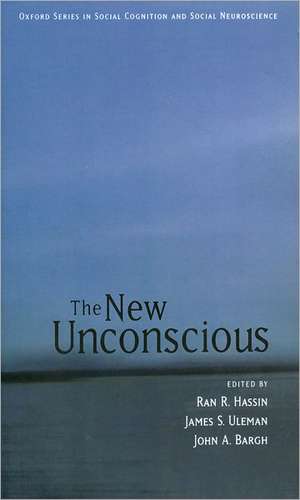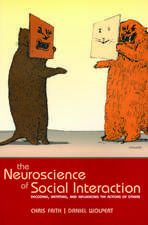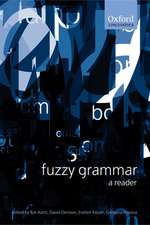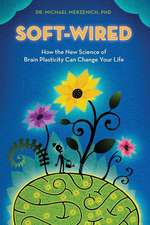The New Unconscious: Social Cognition and Social Neuroscience
Editat de Ran R. Hassin, James S. Uleman, John A. Barghen Limba Engleză Paperback – 7 sep 2006
Preț: 364.67 lei
Preț vechi: 497.11 lei
-27% Nou
Puncte Express: 547
Preț estimativ în valută:
69.80€ • 71.93$ • 58.93£
69.80€ • 71.93$ • 58.93£
Carte tipărită la comandă
Livrare economică 20-26 februarie
Preluare comenzi: 021 569.72.76
Specificații
ISBN-13: 9780195307696
ISBN-10: 0195307690
Pagini: 608
Ilustrații: 20 line illustrations
Dimensiuni: 235 x 161 x 30 mm
Greutate: 0.82 kg
Editura: Oxford University Press
Colecția OUP USA
Seria Social Cognition and Social Neuroscience
Locul publicării:New York, United States
ISBN-10: 0195307690
Pagini: 608
Ilustrații: 20 line illustrations
Dimensiuni: 235 x 161 x 30 mm
Greutate: 0.82 kg
Editura: Oxford University Press
Colecția OUP USA
Seria Social Cognition and Social Neuroscience
Locul publicării:New York, United States
Recenzii
In the past several decades a revolution has occurred in how psychologists view the unconscious. The Freudian view of an infantile, primitive, unconscious has proved to be far too limited; it turns out that a great deal of our mental lives, much of it highly sophisticated and adaptive, occurs behind the curtain of consciousness. Indeed, as illustrated in this fine book, the boundary separating nonconscious from conscious processing is constantly being expanded, to the point where some are questioning whether consciousness serves much of a function at all. The New Unconscious is a must read for anyone interested in these intriguing developments. Most of the key players have contributed to this volume, and their chapters are fascinating reports from the front lines of a true revolution. --Timothy D. Wilson, Sherrell J. Aston Professor of Psychology, University of Virginia, and author of Strangers to Ourselves
Our understanding of the mind is changing fast. The study of cognitive, introspectable processes, which dominated psychology when I was a student, explored the tip of an iceberg of mental activity. Research in social cognition now uses subtle but rigorous behavioral indices of involuntary, unconscious, automatic processes to infer a new view of the mind in which emotions and goals are as important as thinking and knowledge. But this is not the Freudian unconscious. The methods are those of scientific psychology. This book is a rich compendium of recent findings exploring the structure of implicit mental activity, and incidentally challenging conventional views of free will, the self, and the control of actions. --Anne Treisman, James S. McDonnell Distinguished University Professor of Psychology, Princeton University
The title of this book is surprising, but fully justified. This is the book you should read if you want to understand the remarkable progress recently achieved in the empirical study of unconscious mental processes--cognitive, emotional and motivational--and in understanding their correlates in the structure and function of the brain. --Daniel Kahneman, Eugene Higgins Professor of Psychology, Princeton University and Professor of Public Affairs, Woodrow Wilson School
This book picks up where its predecessor, Unintended Thought, left off. The chapters, which are written by some of psychology's most distinguished researchers, provide different and exciting perspectives on the topic of unconscious information processing in social life. This is a first-rate collection of authors and ideas. --Daniel Gilbert, Professor of Psychology, Harvard University
Unintended Thought, the predecessor to this volume, did what few edited volumes do--it shaped an entire field of study. The present volume, The New Unconscious, reveals a more mature discipline--the questions remain just as exciting and challenging, but the evidence moves us perceptibly farther in our understanding of the invisible mind. This collection is the definitive compendium of what we know about the unconscious today. Each chapter made me want to stop doing what I do, and join the authors in their endeavor! --Mahzarin R. Banaji, Richard Clarke Cabot Professor of Social Ethics, Department of Psychology, Harvard University and Carol K. Pforzheimer Professor, Radcliffe Institute for Advanced Study
Our understanding of the mind is changing fast. The study of cognitive, introspectable processes, which dominated psychology when I was a student, explored the tip of an iceberg of mental activity. Research in social cognition now uses subtle but rigorous behavioral indices of involuntary, unconscious, automatic processes to infer a new view of the mind in which emotions and goals are as important as thinking and knowledge. But this is not the Freudian unconscious. The methods are those of scientific psychology. This book is a rich compendium of recent findings exploring the structure of implicit mental activity, and incidentally challenging conventional views of free will, the self, and the control of actions. --Anne Treisman, James S. McDonnell Distinguished University Professor of Psychology, Princeton University
The title of this book is surprising, but fully justified. This is the book you should read if you want to understand the remarkable progress recently achieved in the empirical study of unconscious mental processes--cognitive, emotional and motivational--and in understanding their correlates in the structure and function of the brain. --Daniel Kahneman, Eugene Higgins Professor of Psychology, Princeton University and Professor of Public Affairs, Woodrow Wilson School
This book picks up where its predecessor, Unintended Thought, left off. The chapters, which are written by some of psychology's most distinguished researchers, provide different and exciting perspectives on the topic of unconscious information processing in social life. This is a first-rate collection of authors and ideas. --Daniel Gilbert, Professor of Psychology, Harvard University
Unintended Thought, the predecessor to this volume, did what few edited volumes do--it shaped an entire field of study. The present volume, The New Unconscious, reveals a more mature discipline--the questions remain just as exciting and challenging, but the evidence moves us perceptibly farther in our understanding of the invisible mind. This collection is the definitive compendium of what we know about the unconscious today. Each chapter made me want to stop doing what I do, and join the authors in their endeavor! --Mahzarin R. Banaji, Richard Clarke Cabot Professor of Social Ethics, Department of Psychology, Harvard University and Carol K. Pforzheimer Professor, Radcliffe Institute for Advanced Study


























